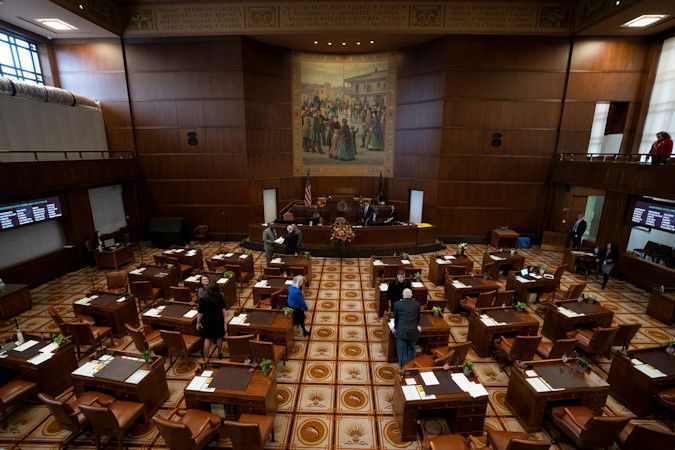Oregon passes campaign finance reform that limits contributions to political candidates

By CLAIRE RUSH
Associated Press
PORTLAND, Ore. (AP) — Oregon lawmakers gave final passage Thursday to a campaign finance reform bill that limits the amount of money people and political parties can contribute to candidates, following recent elections that saw wealthy donors inject millions into key state races.
Oregon is currently one of roughly a dozen states that has no limits on campaign contributions, according to the National Conference of State Legislatures.
Under the bill, starting in 2027, individuals and corporations can only give up to $3,300 to a statewide candidate per election cycle, while political party committees can give up to $30,000. So-called “membership organizations,” such as labor unions and nonprofit advocacy groups, can contribute a total of $26,400 to a statewide candidate per cycle.
Limits would be lower for non-statewide candidates running in legislative, district attorney or circuit court judge races. Political parties and “membership organizations” could donate up to $15,000 and $13,200, respectively, to such candidates. The $3,300 limit for individuals and corporations remains the same.
To promote transparency, the bill also directs the secretary of state, starting in 2028, to create an online dashboard that lists the 100 largest contributors to candidates or campaign committees and shows how much money industry groups donate to candidates.
The bill was approved just days before the end of this year’s short 35-day legislative session, passing 22-6 in the state Senate on Thursday and 52-5 in the state House on Wednesday. Introduced by Democratic House Majority Leader Julie Fahey, it won bipartisan backing.
It now heads to Gov. Tina Kotek, who supports the legislation, her office said in an email Thursday after the bill’s final passage.
The measure was the fruit of negotiations between lawmakers and groups calling for campaign finance reform after recent election cycles saw soaring political donations.
In the 2022 gubernatorial race, the billionaire co-founder of Oregon-based Nike, Phil Knight, donated more than $3.7 million to unaffiliated candidate Betsy Johnson and $1.5 million to Republican candidate Christine Drazan. Kotek, a Democrat, was ultimately elected governor.
“We don’t want to live in a world where the Phil Knights and the other big spenders can just spend unlimited money,” Jason Kafoury with Honest Elections Oregon said while testifying in support of the bill. “Phil Knight will have to give $3,300 just like everybody else.”
Kafoury has advocated for campaign finance reform for years and hailed the bill’s passage as a “remarkable accomplishment.” He said Honest Elections Oregon and another group that had been pushing to get the issue on the November ballot will drop their petitions if the governor signs it.
Some lawmakers expressed concern that contribution limits would make it harder for candidates to afford their campaigns. While she voted in favor of the bill, Democratic state Sen. Elizabeth Steiner questioned “how limiting how much money goes into elections is going to change how much advertisers and printers and the post office charge us to actually get our messages out there.”
Senate GOP Minority Leader Tim Knopp was among the Republicans who voted for the bill.
“It is a little bit confusing and it’s going to take time for everyone to get used to it. But nonetheless it is I think a step forward that Oregonians support,” he said on the Senate floor.
The bill would align Oregon with federal campaign contribution limits for candidates. Under federal law, individuals can donate up to $3,300 to federal candidates per election, although the amount of money they can give to political action committees known as Super PACs has no cap.